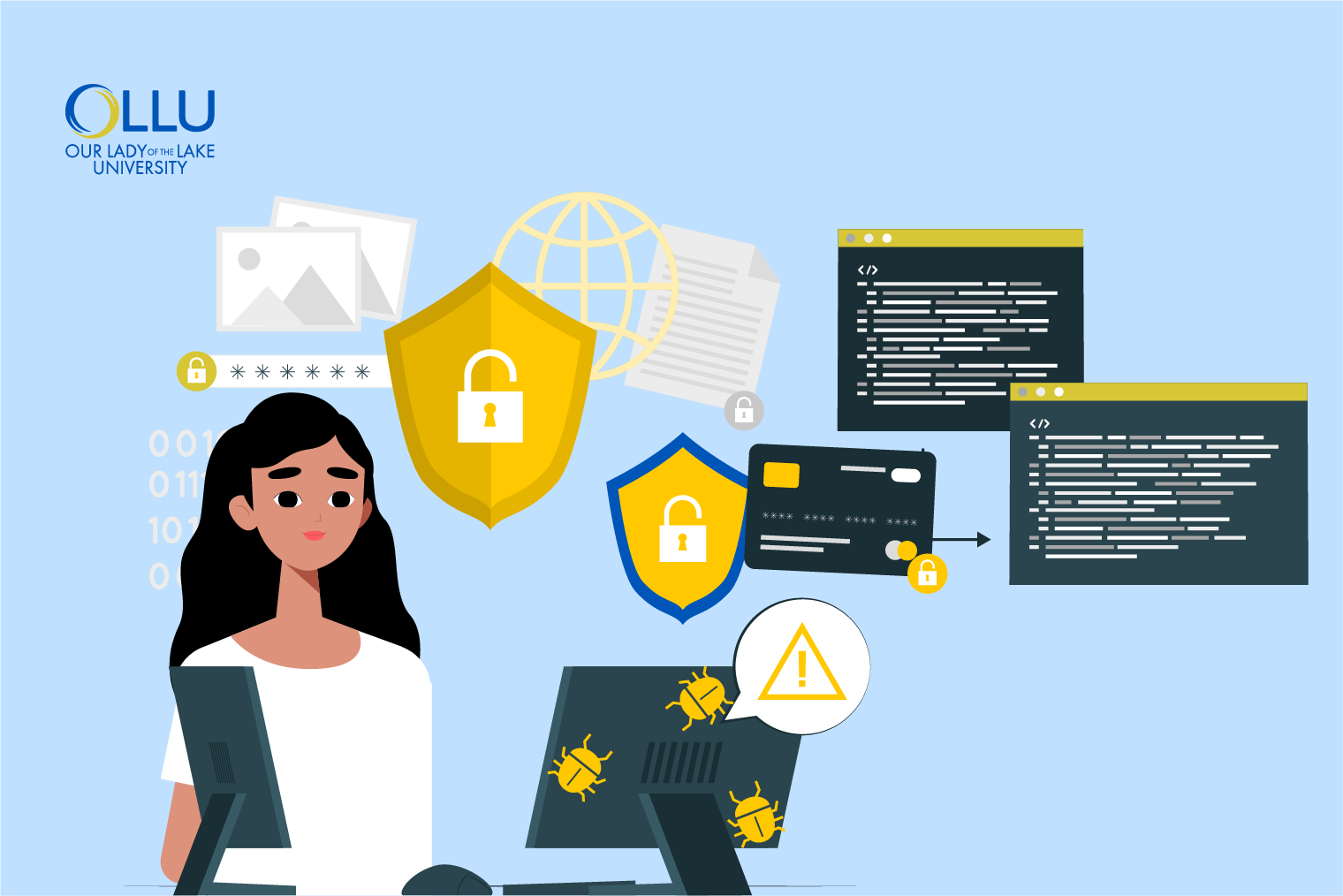A Step-by-Step Guide To Becoming a Cybersecurity Analyst
Oct 14, 2023

Whether you’re a recent high school graduate eager to chart your path or someone seeking a fresh start in the professional world, cybersecurity offers a compelling choice for all. In fact, data reveals that the average age of a cybersecurity analyst is 42 years old, emphasizing the point that it’s never too late to dive into this dynamic field.
So, if you’re wondering how to become a cybersecurity analyst, allow us to guide you through this rewarding and ever-evolving profession, where your passion for technology and safeguarding digital landscapes can find its true calling.
What Is a Cybersecurity Analyst?
A cybersecurity analyst is an expert in the field of information technology, entrusted with the vital role of protecting an organization’s digital assets and confidential data from unauthorized access, cyberattacks and potential breaches. In addition to that, they are responsible for restoring data protection in case of a compromise.
These professionals play a critical role in maintaining data integrity, confidentiality and availability by implementing security measures and staying ahead of evolving cyber threats. They must possess a deep understanding of cyber threats, attack vectors and security protocols, allowing them to mitigate risks effectively.
What Does a Cybersecurity Analyst Do?
The exact duties of a cybersecurity analyst depend on various factors, including the company they work for. In a small company, they might handle tasks from multiple areas of cybersecurity. At the same time, in a larger one, they may specialize in a specific area as part of a larger security team.
However, some typical responsibilities of a cybersecurity analyst’s job description include:
- Setting up and using security tools like firewalls and encryption software.
- Monitoring network activity for security issues.
- Investigating and responding to breaches.
- Fixing any security weaknesses in preparation for cyberattacks.
- Creating and promoting good security practices.
- Researching potential threats.
- Conducting risk assessments and performing tests to find vulnerabilities.
- Writing detailed reports about any incident.
How To Become a Cybersecurity Analyst

Although pathways can vary from student to student, the most common route to becoming a cybersecurity analyst involves a combination of education, certifications, practical experience and ongoing learning. Below, we provide a guide with all the necessary steps to become a cybersecurity analyst.
Educational pathways
Selecting the right educational pathway is a crucial first step toward becoming a cybersecurity analyst. Pairing a relevant degree with certifications can provide a solid foundation in the theoretical knowledge and practical skills fundamental for success in this field.
Degrees
First, you need a degree in cybersecurity or a related field, such as Computer Information Systems and Security. Bachelor’s programs in these disciplines provide a structured curriculum that explores critical areas of cybersecurity such as network security, cryptography, risk management and ethical hacking, thus equipping you with the theoretical understanding and practical skills needed to protect digital assets and mitigate cyber threats effectively.
Additionally, it’s worth noting that pursuing advanced degrees, such as a Master’s degree in Cybersecurity, can be a strategic move even after entering the field through an entry-level position. The specialized knowledge gained through a graduate degree program equips you with a competitive edge in the job market, as you will possess targeted expertise in safeguarding against cyber threats.
Many universities offer flexible online programs tailored for working professionals, allowing you to further your education while gaining practical experience. For example, our university offers an outstanding online Master’s program in Cybersecurity, recognized as one of the leading options in Computer Information Technology Programs by U.S. News & World Report.
Certifications
In addition to the formal education mentioned, certifications also play a crucial role in the journey toward becoming a proficient cybersecurity analyst. They validate specific skills and knowledge areas, providing tangible evidence of expertise to potential employers. Pursuing reputable certifications is essential in demonstrating one’s commitment to the field and staying updated with the latest industry standards.
At our university, we recognize the significance of certifications in the cybersecurity domain. As such, we offer an outstanding Cybersecurity Certificate that can help equip you with the practical skills and credentials needed to thrive in this field.
Essential skills for success
Success as a cybersecurity analyst relies heavily on a balanced development of both technical and soft skills. The technical skills ensure you can navigate complex systems, detect vulnerabilities and implement robust security measures.
On the other hand, soft skills are just as crucial as they guarantee you possess the right mindset and capabilities to effectively implement all the technical security measures and work well with the rest of the team. Below, we list some essential technical and soft skills needed for this role.
Technical skills
- Ability to work with various network security devices, such as firewalls.
- Familiarity with intrusion detection systems (IDS) and intrusion prevention systems (IPS).
- Understanding of vulnerability assessment and management.
- Expertise in penetration testing.
- Competency in security information and event management (SIEM).
- Knowledge of encryption techniques.
- Ability to work with securing operating systems, such as Windows, Linux and MacOS.
- Proficiency in web application security.
Soft skills
- Possession of critical thinking and problem-solving skills.
- Capability to adjust and thrive in changing circumstances.
- Excellent attention to detail.
- Strong written and verbal communication skills.
- Ability to work well with other team members.
- Effective time management skills.
- Commitment to ongoing learning.
- Consistent adherence to ethical guidelines.
Acquiring practical experience
While formal employment as a cybersecurity analyst typically requires a bachelor’s degree and relevant certifications, gaining professional experience beforehand can significantly enhance your eligibility. Employers highly value hands-on familiarity with tools like intrusion detection systems, firewalls and penetration testing platforms, as they directly showcase your ability to tackle security challenges.
You can put theoretical knowledge into real-world practice and gain experience through internships, entry-level roles, and participation in cybersecurity competitions, among other ways. Additionally, if you are looking to transition from another information technology (IT) role, leveraging any entry-level IT positions to develop crucial skills can strengthen your resume.
The importance of continuous learning
Next, you must understand that to become a cybersecurity analyst, you must commit to lifelong learning. This field is expansive and constantly evolving, with new threats and technologies emerging regularly. To excel, you must be ready and willing to continuously acquire new knowledge and adapt to recent changes.
This involves staying updated on the latest security trends, attending conferences, participating in workshops, and pursuing advanced certifications. Your dedication will ensure you can effectively fulfill your duties even in an ever-changing landscape.
The power of networking
Cybersecurity analyst qualifications and skills are essential, but sometimes, who you know can be just as crucial. In fact, a substantial 80% of professionals attribute their career success to effective networking. Therefore, building a strong professional network is the next step.
Attending industry conferences, workshops and seminars is highly recommended to meet professionals and experts who share your interests in cybersecurity. Additionally, online forums and communities dedicated to cybersecurity discussions are great platforms for engaging with peers, while LinkedIn is an excellent resource for establishing valuable connections.
Through your networking links, you can gain insights into industry trends and discover potential job openings, as well as mentorship and collaborative opportunities, thus enhancing your prospects in the cybersecurity field.
Creating a killer portfolio
The penultimate step toward attaining a role as a cybersecurity analyst involves building a strong portfolio through which you can distinguish yourself from other candidates when pursuing job opportunities. The portfolio will serve as proof of your distinctive abilities and notable accomplishments, providing prospective employers with valuable insights into your skill set and work ethic, potentially playing a decisive role in their decision to hire you for the position.
Applying to cybersecurity jobs
Now, all that is left to do is apply for cybersecurity jobs. Remember that it’s crucial to customize your resume and cover letters for each position you apply for, highlighting relevant skills, certifications and experience that directly align with the job description.
Additionally, research the company and its specific security needs to ensure you’re well-prepared for any interviews or assessments that may follow. The goal is to show employers you’re a perfect fit for the role.
Embracing the Challenges and Rewards
Navigating the cybersecurity landscape presents a dynamic set of challenges. To begin, the nature of the work means that you will be constantly presented with new challenges. As a cybersecurity analyst, you need to always stay ahead, which can be stressful. Additionally, the field may often place you in high-pressure situations. When responding to security incidents, you’ll face intense and time-sensitive scenarios that demand quick and effective decision-making.
Yet, within these challenges lie a plethora of rewards. There is a clear path for growth and specialization within the field, and the profession brings a high degree of job satisfaction. Successfully identifying and mitigating security risks provides a profound sense of accomplishment and professional fulfillment. In fact, based on data collected from hundreds of respondents, it has been found that cybersecurity analysts generally report a job satisfaction rating of 4 out of 5.
All this is complemented by competitive salaries and job security, making a career in cybersecurity not only intellectually stimulating but also financially rewarding and stable.
How Much Can You Make as a Cybersecurity Analyst?

According to recent data, as a cybersecurity analyst in the United States, you can anticipate an estimated annual total pay averaging around $97,162. This figure encompasses a salary range spanning from approximately $77,000 to $123,000 per year.
The exact salary varies significantly based on several factors, including years of experience, level of education, geographic location, the specific company or organization and additional certifications or specialized skills.
Is Cybersecurity a Growing Field?
Recent data from the Bureau of Labor Statistics highlights the promising job outlook for professionals in computer and information technology roles, encompassing cybersecurity careers. Projections for the decade from 2022 to 2032 indicate a substantial growth rate, exceeding the average for all occupations, with an estimated 377,500 new job openings every year. Additionally, the global labor market has witnessed an impressive 60% surge in the demand for cybersecurity experts over the past two years.
The Bottom Line
A winning formula to becoming a cybersecurity analyst often involves a blend of education, certifications, and hands-on experience. So, whether you’re just starting out or seeking a transformative career shift, the realm of cybersecurity beckons with its promise of challenges met and digital realms secured.
Ready to take the next step? Join our esteemed Master of Science in Cybersecurity or Graduate Certificate in Cybersecurity program today and embark on your exciting journey toward becoming a cybersecurity expert!
FAQ
How long does it take to become a cybersecurity analyst?
It depends on the path you follow. But, it typically takes about 4-6 years to fulfill the educational requirements and gain relevant experience.
Is it hard to become a cybersecurity analyst?
It can be challenging due to the evolving nature of cybersecurity, but with dedication and continuous learning, it’s totally achievable.
What degree is best for a cybersecurity analyst?
A degree in cybersecurity, computer science, or a related field is often preferred. However, relevant certifications and experience can also be valuable.
How can I become a cybersecurity analyst without a degree?
You can pursue certifications that serve as alternatives to cybersecurity degrees, gain hands-on experience through various projects and internships and build a strong portfolio.
How can I become a cybersecurity analyst with no experience?
In addition to pursuing a degree and relevant certifications, consider pursuing internships or entry-level positions in IT and build a portfolio showcasing your skills and knowledge.